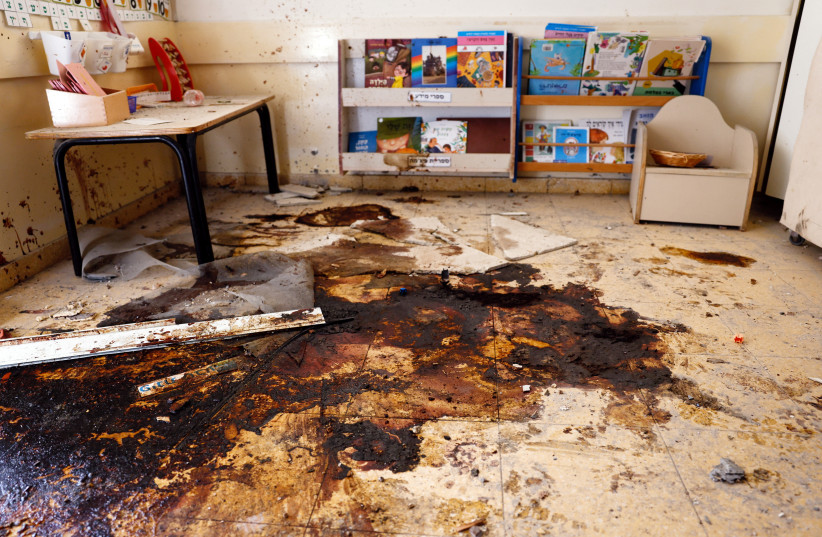Becoming a mother after October 7 is challenging. During the first month, mothers felt that they had broken a promise they had made to their unborn children; they felt they couldn’t protect them.
New mothers, like most parents in Israel, felt all through October that evil had been unleashed, and no sight was void of it.
Other new mothers felt guilty that they were experiencing joy as Shiri Bibas and her little redheads were held hostage. Some new mothers are having a harder time managing than others.
What is PPD?
The term “perinatal mental health issues” refers to mental health challenges women face during pregnancy and postpartum.
Mental health challenges have been widely discussed during these past 90 days. As a mental health professional, I feel that there is another aspect of it that has been on the sidelines, and that is the mental health challenges faced by women who have given birth since October.

What was once known as postpartum depression (PPD), thus excluding anxiety as one of the symptoms, is now called perinatal mental health (O’Hara & Wisner, 2014), a definition that includes depression, anxiety, and, in rare cases, even psychosis. As with all mental health challenges, the prevalence of this illness within society has been growing, and it is now at 12%-15%.
There is a great dissonance between war and childbirth. Childbirth is a special occasion that brings a family together, but now we see more and more new mothers giving birth alone, as their partners are deployed fathers who have only seen their young babies for a couple of hours.
There is no question that these are not normal circumstances, and the mental health professionals here in Israel keep talking about a normal response. The not-normal reality is that in these extreme circumstances, we should be even more aware of the fragile state of perinatal mental health, as the whole of society is having challenges with sleep and nutrition, and everybody is on edge; this population is even more susceptible.
According to the Diagnostic and Statistical Manual of Mental Disorders (DSM-5), symptoms can start anytime during pregnancy or during the first year postpartum. They differ for everyone and might include the following: irritability or anger; loss of appetite and sleep disturbance; lack of interest in the baby; crying and sadness; feelings of shame, guilt, or sense of hopelessness; loss of interest or pleasure in things once enjoyed; possible thoughts of harming the baby or oneself.
The risk factors for PPD include personal/family history of PPD; depression or anxiety; IVF/infertility treatments; premenstrual syndrome (PMS) or premenstrual dysphoric disorder (PMDD); complicated pregnancy; breastfeeding complications; birth complications for the mother or baby; major life events; inadequate support system or community; inadequate childcare; marital issues; financial issues; mothers of multiples.
Perinatal depression is the most common complication of childbirth. The transition to motherhood is a challenging and lonely one, whether it is the first child or, for example, the fifth. Depression during and after pregnancy happens more often than most people realize. The prevalence of this phenomenon worldwide is between 12%-15% and is continually on the rise (Howard & Khalifeh, 2020). Most people do not realize that hormonal shifts can create a severe mood disorder.
There is a range of symptomatology, the most common of which is anxiety (American Psychiatric Association, 2013). According to the DSM-5 (American Psychiatric Association, 2013), symptoms can start anytime during pregnancy or during the first year postpartum.
The empirical findings within the realm of perinatal mental health have underscored the potential efficacy of implementing structured schedules and routines as a viable intervention for addressing PPD, as highlighted by Rahman (2013). Based on this, helping these new mothers should concentrate on two specific behaviors: social interactions and eating habits. By planning and implying purposeful schedule modifications, such as planned mealtime, the expectation is that the new mother’s mental health will improve.
IN ISRAEL, the nurses in Tipat Halav have been instructed to give out the EPDS questionnaire for over a decade now; the Edinburgh Postnatal Depression Scale is the tool most used to assess perinatal mental health (Guedeney et al., 2000). The questionnaire comprises 10 statements – for example: “I have been able to laugh and see the funny side of things” or “I have been so unhappy that I have had difficulty sleeping.”
In Jerusalem, these nurses refer women who score high on the questionnaire (meaning they may have prenatal mental health issues) to a project called Hevlei Kesher, where a social worker contacts the new mother and helps her better understand how to deal with the challenges she faces.
Perinatal mental health issues are manageable and treatable. We should also note that this war has also manufactured new mothers who are also new to the title of widowhood or are adjusting to the wounds and new handicaps of their partner.
If you see a new mother struggling, help her reach out for support. If you see a new mother around, she doesn’t need to be a first-time mother; it can be her second, third, or even sixth child. You can ask if she needs help and offer to bring her some takeout, ask if she needs company, and, if you think she needs more help, encourage her to ask the nurse in Tipat Halav for a referral.
The writer, an MSW, is a couples and family therapist and a doctoral student at the Wurzweiler School of Social Work at Yeshiva University.
